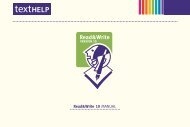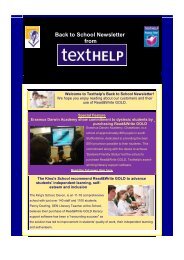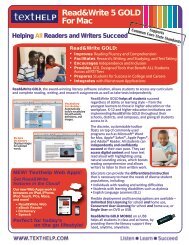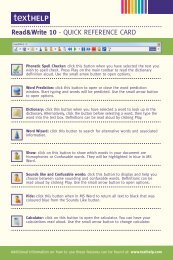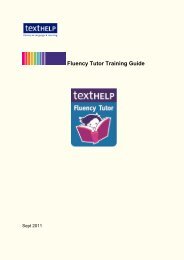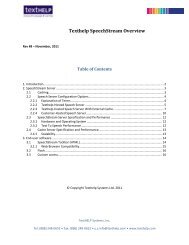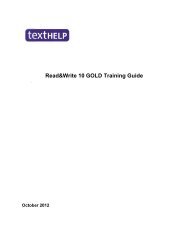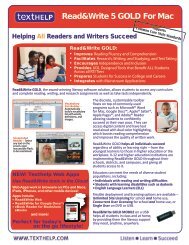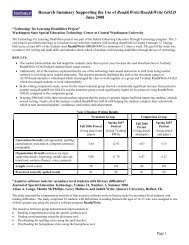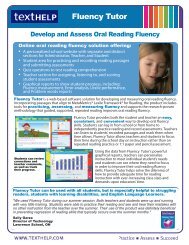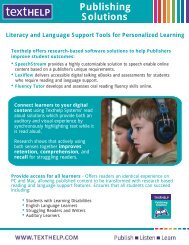01 NRDC Dyslexia 1-88 update - Texthelp
01 NRDC Dyslexia 1-88 update - Texthelp
01 NRDC Dyslexia 1-88 update - Texthelp
Create successful ePaper yourself
Turn your PDF publications into a flip-book with our unique Google optimized e-Paper software.
Developmental dyslexia in adults: a research review 159<br />
Function Checklist item Observations<br />
Comprehension of<br />
spoken language<br />
Has difficulty telling or<br />
understanding jokes (5)<br />
Might indicate inability to recognise<br />
wordplay (which, in turn, might be of<br />
more than one kind).<br />
Misinterprets language, has poor<br />
comprehension of what is said (6)<br />
Might indicate deficits in general or<br />
vocabulary knowledge, insensitivity to<br />
prosody, or difficulty with more complex<br />
syntax.<br />
Writing<br />
Can explain things orally, but not<br />
in writing (15)<br />
Might indicate problems with spelling,<br />
motor control, or the formal structuring<br />
of thought.<br />
Has difficulty in writing ideas on<br />
paper (16)<br />
Might indicate problems with spelling,<br />
motor control, or the formal structuring<br />
of thought.<br />
Has difficulty in completing forms<br />
correctly (18)<br />
Might indicate difficulty with reading,<br />
eyesight, spelling, writing, knowledge of<br />
the conventions (or badly-designed<br />
forms).<br />
Has persistent problems with<br />
sentence structure, writing<br />
mechanics and organising<br />
written work (19)<br />
These are three separate problems, as<br />
in the notes to 15 and 16 above.<br />
Writes illegibly (34)<br />
Might indicate genuine difficulty in fine<br />
motor control, want of adequate<br />
instruction, or lack of motivation.<br />
Written vocabulary limited by<br />
spelling ability (40)<br />
Might indicate a defensive response to<br />
insensitive treatment in school.<br />
Long-term or explicit<br />
memory<br />
Has difficulty in reciting months<br />
forwards (38)<br />
Serial recall might be compromised if<br />
the items were not learned in serial<br />
order.<br />
Finds it difficult to recite the<br />
alphabet (44)<br />
Serial recall might be compromised if<br />
the items were not learned in serial<br />
order.<br />
Misplaces personal possessions<br />
(55)<br />
Verbal short-term<br />
memory<br />
Can learn information presented<br />
in one way but not in another (3)<br />
Ambiguous, in that ‘assimilation’ and<br />
‘retention’ might not be simple<br />
cognitive functions, but generally<br />
perceived as a ‘learning style’ issue,<br />
where there is a preference for visual<br />
over verbal presentation.<br />
Finds it difficult to memorise<br />
information (8)



